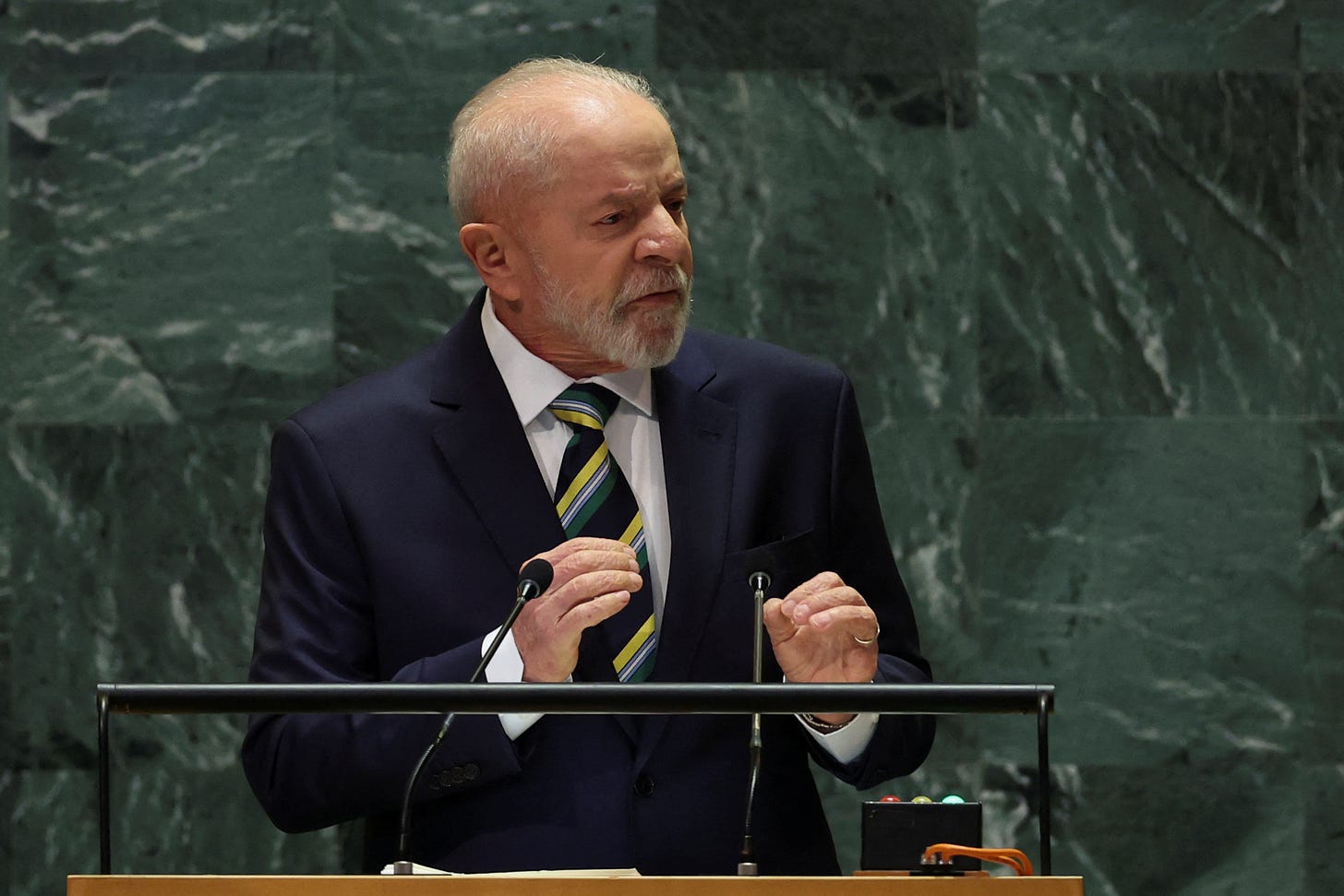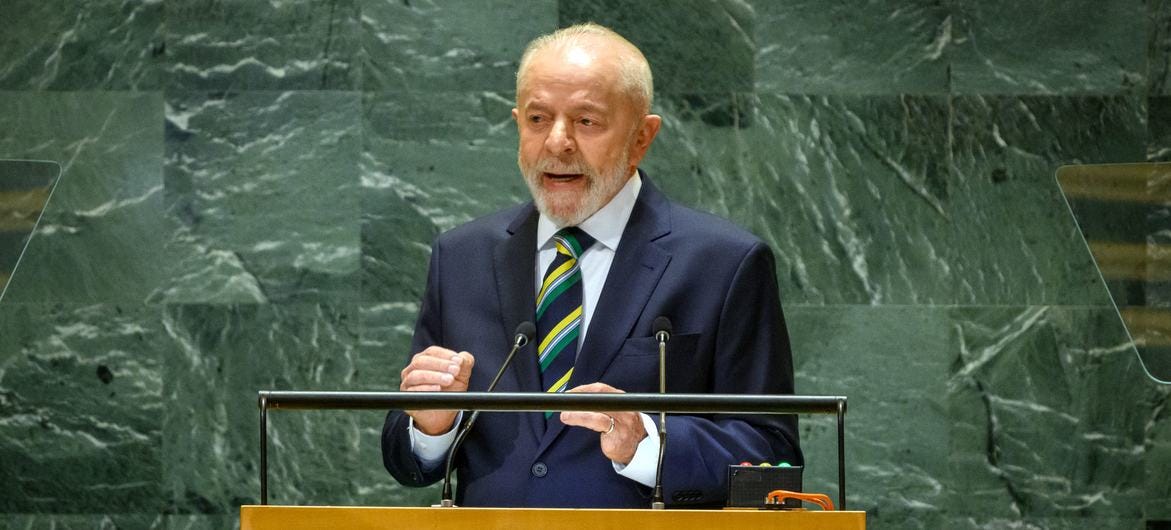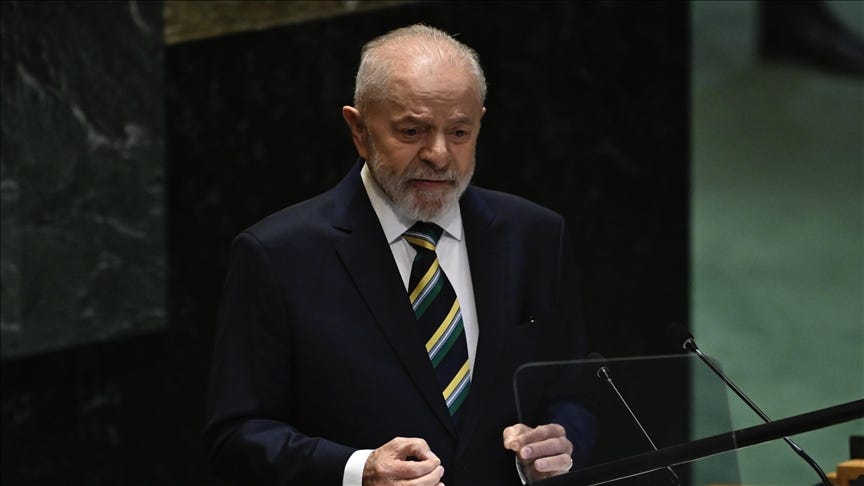Lula Plans Apace
Brazil’s Lula: UN paralysed, crises piling up, world leaders going round in circles, calls for UN Charter review, slams Security Council's inability to solve conflicts. UN Secretary-General's remarks
UN paralysed, crises piling up, world leaders ‘going around in circles’, says Brazil’s Lula
Speaking to world leaders at the General Assembly's annual debate, President Lula lamented that the current global situation, including the seeming paralysis of the UN to act, reflects a “weakening of our collective capacity for negotiation and dialogue.”
By example he said that the recently adopted UN Pact for the Future was limited in scope, though its proposed aim is to chart the course for multilateral relations in the years ahead.
“It's ...limited scope is also an expression of the paradox of our time: We go around in circles between possible compromises that lead to insufficient results,” he argued.
Moreover, despite the challenges posed by the COVID-19 pandemic, no comprehensive treaty on pandemics has been adopted by the UN World Health Organization (WHO).
He continued, “We are living in a time of growing anguish, frustration, tension, and fear” and criticized the rising military budgets and conflicts, stating that the use of force is becoming the norm, often without the backing of international law.
Mr. Lula firmly condemned the invasion of Ukraine and, alongside China, has sought to promote constructive dialogue through a proposed “six-point plan.”
The humanitarian crises in Gaza and the West Bank were also focal points of his speech. Describing the situation as one of the greatest humanitarian crises in recent history, the Brazilian President condemned what he saw as the collective punishment of the Palestinian people, noting the tragic loss of over 40,000 lives, primarily among women and children.
“The right to defense has become the right to vengeance,” President Lula said, expressing his concern about the current escalating situation in Lebanon.
Turning to climate change, President Lula warned that “we are doomed to climate change interdependence,” stressing that future generations will bear the consequences of unfulfilled climate commitments.
He emphasized Brazil’s commitment to environmental protection, stating that deforestation in the Amazon has been reduced by 50 per cent and aims to be eradicated by 2030.
In a call for reform of the global financial system, President Lula pointed out that low- and middle-income countries are often disadvantaged, leading to a “reverse Marshall Plan” where the poorest finance the richest.
Highlighting the stark contrast in borrowing rates between African nations and wealthier countries, he urged greater representation of developing countries in institutions like the International Monetary Fund (IMF) and the World Bank.
Finally, he proposed a “comprehensive review” of the UN Charter and called for urgent reforms within the Organization itself, advocating for the Security Council to reconsider its exclusionary practices regarding permanent seats for Latin American and African countries.
He concluded with a reminder that the world cannot afford to wait for another tragedy to prompt necessary governance changes, urging that the will of the majority must prevail over entrenched power structures.
Click here to download the statement (in Portuguese).
https://news.un.org/en/story/2024/09/1154836
Brazil’s Lula calls for UN Charter review, slams Security Council's inability to solve conflicts
WASHINGTON
Brazilian President Luiz Inacio Lula da Silva said Wednesday that the UN Security Council has been incapable of solving conflicts, and Brazil may propose a conference to review the UN Charter.
The UN must always be at the center of global governance that it is going through a crisis of trust, which he said must be reestablished.
Lula criticized the Security Council, while he spoke at a G20 ministers' meeting on the margins of the UN General Assembly in New York, and said it has proven "incapable of solving conflicts and even less capable of preventing them."
"Its procedures lack transparency and decisions lack coherence. Millions of people suffer the consequences of this inefficiency," said Lula as he urged greater inclusion of nations from Africa and Latin America and the Caribbean regions.
"We will force changes to overcome the polarization that paralyzes the Council," he said, noting that Brazil is considering presenting a proposal to call for a conference to review the UN Charter, based on Article 109, which provides rules for the convening of a General Conference of UN member states to review the UN's Charter.
"Each country may have its own vision regarding the ideal model for reforming the global governance system. We must all agree that the reform is fundamental and the reform is urgent," he added.
https://www.aa.com.tr/en/world/brazil-s-lula-calls-for-un-charter-review-slams-security-councils-inability-to-solve-conflicts/3341373
Lula at UN touts Brazil-China plan for Ukraine-Russia talks
September 24, 202410:13 PM GMT+6:30Updated 4 days ago

UNITED NATIONS, Sept 24 (Reuters) - Brazilian President Luiz Inacio Lula da Silva advocated on Tuesday for a plan for talks between Russia and Ukraine to end their conflict, a proposal already rejected by Ukraine's President Volodymyr Zelenskiy.
Lula, who has spoken to Russian President Vladimir Putin by telephone about the proposal, did not give any details of the six-point plan in his speech at the opening of the United Nations General Assembly.
His foreign policy adviser Celso Amorim will seek support for the plan from representatives of 20 countries when they meet in New York on Friday, Brazilian diplomats said.
Zelenskiy has rejected the proposal as "destructive" and insisted his summit initiative is the only viable peace format.
The Chinese-Brazilian proposal, which was made public in May after Amorim visited Beijing, calls for de-escalating the situation and the resumption of direct dialogue without requiring Russia to pull back.
Friday's meeting will include countries from the Global South, but not European governments that are the staunchest supporters of Ukraine. Among those invited are Colombia, Egypt, Indonesia, Mexico, Saudi Arabia, South Africa and the United Arab Emirates.
"The intention is to listen to what these countries can bring, create a critical mass and review these points," a Brazilian official told Reuters. "Many countries want to listen, including the Europeans."
In his speech, Lula warned that the conflict in Gaza is expanding "dangerously" to Lebanon, adding to calls for a ceasefire.
"The right of defense has turned into the right of revenge, which prevents an agreement to release hostages and postpones a ceasefire," Lula said.
The Brazilian leader repeated his country's plea for reform of the United Nations, saying the global body was not doing its job representing the world and stopping wars.
He criticized the tens of billions of dollars spent every year on military arsenals and said these funds should be used to eliminate poverty and fight climate change.
Lula called for revision of the U.N. charter to revitalize the role of the General Assembly in promoting peace and reform of the multilateral institution.
"The exclusion of Latin America and Africa from permanent seats on the U.N. Security Council is an unacceptable reflection of the colonial past," he said.
Reporting by Anthony Boadle and Lisandra Paraguassu in Brasilia and Gabriel Araujo in Rio de Janeiro; Editing by Howard Goller
https://www.reuters.com/world/lula-un-says-brazil-china-propose-plan-ukraine-russia-talks-2024-09-24/
Secretary-General's remarks to meeting of G20 Foreign Ministers [as delivered]
Agradeço ao Presidente Luiz Inácio Lula da Silva e ao governo do Brasil por co-organizar esta reunião entre os ministros das Relações Exteriores do G20, todos os Estados Membros das Nações Unidas, e as organizações financeiras internacionais.
[I thank President Luiz Inácio Lula da Silva and the government of Brazil for co-convening this meeting between G20 foreign ministers, all UN Member States, and the international financial organizations.]
This is a historic first.
The G20, the United Nations system and the Bretton Woods institutions and other international financial institutions deal with some of the most important challenges of our time: inequality, financing for development, the climate crisis, the impact of new technologies.
In all these areas, progress is slipping out of reach as our world becomes more unsustainable, unequal and unpredictable.
Conflicts are raging, the climate crisis is accelerating, inequalities are growing, and new technologies have unprecedented potential for good – and bad.
Global institutions must work together – not on parallel or conflicting tracks.
They must cooperate and collaborate for the good of humanity and the Summit of the Future was an essential first step.
It has created opportunities and possibilities for reform across the board.
But without implementation, it will be meaningless.
The work starts today.
Excellencies,
The Pact for the Future is about action in the here and now.
And G20 countries can act in three specific areas.
First, finance.
We need ambitious reforms of the international financial architecture to make it fully representative of today’s global economy, so it can provide strong support to implement the Sustainable Development Goals.
I commend the leadership of the World Bank and International Monetary Fund for making important progress.
But the resources available are still dwarfed by the size of the needs.
Many developing countries are being hit by a double whammy of climate chaos and debt.
To support low- and middle-income developing countries effectively, multilateral development banks must be bigger, bolder and better.
We need a far more robust financial safety net to shield countries in a world of frequent shocks.
Voting rights and decision-making rules should reflect the changing global landscape.
And access to concessional finance should be based on needs and vulnerabilities, not just on income.
All parts of the global financial system must work together to reduce the cost of finance and the inequalities that blight our world.
This demands action on debt – starting with an effective mechanism to deal with debt relief and restructuring.
As a first step, I welcome the commitment by the International Monetary Fund to review the debt architecture – as set out in the Pact for the Future.
I look to all G20 countries to push for deep reforms so that global financial institutions reflect today’s world and respond to today’s challenges.
One of those challenges is global hunger. It is shameful that in our world of plenty, around one person in ten regularly goes without food for an entire day or more – known as severe food insecurity.
I welcome President Lula and Brazil’s focus on global hunger during the G20 presidency and call on all G20 countries – and all UN Member States – to strengthen efforts to end this affront to our common humanity.
Excellencies,
The second area for action is climate.
We are at a critical moment: a battle to prevent temperatures from rising above the agreed limit of 1.5 degrees.
Today’s decisions and actions will determine the course of our world for decades to come.
The climate crisis transcends borders and politics. Climate action cannot be a victim of geopolitical competition.
Under G20 leadership we will be able to have drastic reductions in fossil fuel production and consumption as an essential element for climate action.
By 2030, global production and consumption of all fossil fuels must decline by at least thirty per cent – and global renewables capacity must triple.
This requires OECD countries to phase out coal by 2030 and to fully decarbonize power generation systems by 2035.
And it means non-OECD countries must phase out coal by 2040.
I have been strongly advocating for no new coal or upstream oil and gas projects for all G20 nations.
New national climate plans due next year are an opportunity for countries to align energy strategies and development priorities with climate ambition, taking into account the principle of common but differentiated responsibilities.
They must also show how each country intends to transition away from fossil fuels, in line with the outcome at COP 28.
Excellencies,
There has never been a greater global challenge than the climate crisis.
There has never been more agreement on the solution: a just transition from fossil fuels to renewable energy.
And renewable technologies have never been better – or cheaper.
The obstacle to the renewables revolution is not economics, or a lack of solutions.
It is mindsets, and lack of vision.
Those that lead the renewables revolution are already reaping the rewards.
But many developing countries are being left behind.
Clean energy investments in emerging and developing economies outside China and India have barely increased since 2015.
The energy transition must be based on justice and equity, so that all countries benefit.
Excellencies,
Third, we need strong, inclusive, legitimate global institutions and tools to tackle the challenges of today and tomorrow.
Fair and representative governance is a first step to unlock broader reforms.
The Pact for the Future includes commitments to make multilateral institutions more representative, effective, transparent and accountable.
I urge the strong engagement of G20 countries, including in reforms of our United Nations bodies:
Making the Security Council truly representative by addressing the under-representation of Africa, Asia-Pacific, Latin America and the Caribbean;
Strengthening the role of the General Assembly and the Peacebuilding Commission;
And enhancing the Economic and Social Council.
The same principle applies to the international financial architecture: it should correspond to today’s global economy, with much stronger representation of developing countries.
For our part, the United Nations is totally committed to strengthening our convening role as an inclusive platform for dialogue and action.
As part of that role, from next year, we intend to host biennial summits to formalize a dialogue between the UN system, the G20, and international financial institutions.
Excellencies,
Only together will we achieve the reforms in the Pact for the Future and deliver the SDGs and the Paris Agreement, to meet the expectations of the people we serve.
I urge the G20 to seize every opportunity to raise ambition for global leadership and transformative action for a safer, more peaceful and sustainable world for all.
Thank you.




